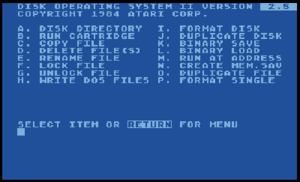Atari DOS

Atari DOS version 2.5, main menu
|
|
| Developer | Atari, Inc., Atari Corporation |
|---|---|
| Working state | Discontinued |
| Source model | Closed source |
| Initial release | 1979 |
| Latest release | XE 1.0 / 1987 |
| Available in | English |
| Platforms | Atari 8-bit family |
| Default user interface | Menu |
| License | Proprietary EULA |
Atari DOS is the disk operating system used with the Atari 8-bit family of computers. Operating system extensions loaded into memory were required in order for an Atari computer to manage files stored on a disk drive. These extensions to the operating system added the disk handler and other file management features.
The most important extension is the disk handler. In Atari DOS 2.0, this was the File Management System (FMS), an implementation of a file system loaded from a floppy disk. This meant at least an additional 32 KB Random access memory was needed to run with DOS loaded.
There were several versions of Atari DOS available, with the first version released in 1979.
In the first version of DOS from Atari all commands were only accessible from the menu. It was bundled with the 810 disk drives. This version was entirely memory resident, which made it fast but occupied memory space.
The second, more popular version of DOS from Atari was bundled with the 810 disk drives and some early 1050 disk drives. It is considered to be the lowest common denominator for Atari DOSes, as any Atari-compatible disk drive can read a disk formatted with DOS 2.0S.
DOS 2.0S consisted of DOS.SYS and DUP.SYS. DOS.SYS was loaded into memory, while DUP.SYS contained the disk utilities and was loaded only when the user exited to DOS.
In addition to bug fixes, DOS 2.0S featured improved NOTE/POINT support and the ability to automatically run an Atari executable file named AUTORUN.SYS. Since user memory was erased when DUP.SYS was loaded, an option to create a MEM.SAV file was added. This stored user memory in a temporary file (MEM.SAV) and restored it after DUP.SYS was unloaded. The previous menu option from DOS 1.0, N. DEFINE DEVICE, was replaced with N. CREATE MEM.SAV in DOS 2.0S.
Version 2.0S was for single-density disks, 2.0D was for double-density disks. 2.0D shipped with the 815 Dual Disk Drive, which was both expensive and incompatible with the standard 810, and thus sold only a small number; making DOS version 2.0D rare and unusual.
...
Wikipedia
